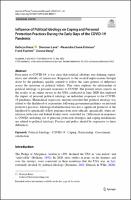Please use this identifier to cite or link to this item:
https://hdl.handle.net/20.500.12202/9507Full metadata record
| DC Field | Value | Language |
|---|---|---|
| dc.contributor.author | Krase, Kathryn | - |
| dc.contributor.author | Lane, Shannon | - |
| dc.contributor.author | Fishman, Alexandra Chana | - |
| dc.contributor.author | Fuentes, Frank | - |
| dc.contributor.author | Wang, Donna | - |
| dc.date.accessioned | 2023-11-21T20:39:48Z | - |
| dc.date.available | 2023-11-21T20:39:48Z | - |
| dc.date.issued | 2022 | - |
| dc.identifier.citation | Krase, K., Lane, S. R., Fishman, A. C., Fuentes, F., & Wang, D. (2022). Influence of political ideology on coping and personal protection practices during the early days of the COVID-19 pandemic. Journal of Policy Practice and Research, 1-16. https://doi.org/10.1007/s42972- 022-00060-7 | en_US |
| dc.identifier.issn | 2662-1517 | - |
| dc.identifier.uri | https://link.springer.com/article/10.1007/s42972-022-00060-7 | en_US |
| dc.identifier.uri | https://hdl.handle.net/20.500.12202/9507 | - |
| dc.description | Scholarly article / Open access | en_US |
| dc.description.abstract | Even prior to COVID-19, it was clear that political ideology was defining experiences and attitudes of Americans. Responses to the societal repercussions brought about by the pandemic quickly seemed to follow the same pattern of difference across the spectrum of political beliefs. This study explores the relationship of political ideology to personal responses to COVID. The present article reports on the results of an online survey in the USA conducted in June 2020 that explored the impact of personal political ideology on individual responses to the COVID- 19 pandemic. Hierarchical regression analyses revealed that political ideology was related to the likelihood of respondents following government guidance on personal protective practices. Ideological identification was not a significant predictor of the likelihood to specifically follow guidance from state officials, specifically, when satisfaction with state and federal leaders were controlled for. Differences in responses to COVID, including use of personal protection strategies and coping mechanisms are related to political ideology. Practice and policy should be responsive to these differences. | en_US |
| dc.language.iso | en_US | en_US |
| dc.publisher | Springer | en_US |
| dc.relation.ispartofseries | Journal of Policy Practice and Research;4(1) | - |
| dc.rights | Attribution-NonCommercial-NoDerivs 3.0 United States | * |
| dc.rights.uri | http://creativecommons.org/licenses/by-nc-nd/3.0/us/ | * |
| dc.subject | Political Ideology | en_US |
| dc.subject | COVID-19 | en_US |
| dc.subject | Coping | en_US |
| dc.subject | Partisanship | en_US |
| dc.subject | Government satisfaction | en_US |
| dc.title | Influence of political ideology on coping and personal protection practices during the early days of the COVID-19 pandemic | en_US |
| dc.type | Article | en_US |
| dc.identifier.doi | https://doi.org/10.1007/s42972- 022-00060-7 | en_US |
| dc.contributor.orcid | 0000-0002-6140-4223 | en_US |
| local.yu.facultypage | https://www.yu.edu/faculty/pages/krase-kathryn | en_US |
| Appears in Collections: | Wurzweiler School of Social Work: Faculty publications | |
Files in This Item:
| File | Description | Size | Format | |
|---|---|---|---|---|
| Lane Krase 2022 OA Influences s42972-022-00060-7.pdf | 429.21 kB | Adobe PDF |  View/Open |
This item is licensed under a Creative Commons License

